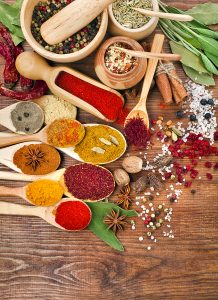If you’re anything like the average American, you’re consuming way too much sodium. You may have tried to kick the habit, but found that you just don’t like the taste of low sodium foods as much.
A recent study published in the journal Appetite may help. Researchers split about 150 participants into three groups to test how much they liked three soups over repeated tastings: a standard tomato soup, a low sodium 
tomato soup, and a low sodium tomato soup seasoned with herbs and spices.
On the first day of the study, everyone tasted samples — about two tablespoons each — of all three soups. For the next three days, participants ate larger portions of their one assigned soup. On the last day, all three groups again sampled small portions of the three soups. Participants rated how much they liked each soup every day.
Results from the study suggest three strategies that can help you cut back on sodium without sacrificing flavor:
- Find the blend that you like best. Before beginning the study, researchers tested three different herb and spice blends to add to the low sodium soup: blends were based around basil, cumin and coriander, or oregano. No one blend was a clear favorite among participants overall, but individual participants had definite preferences. The lesson is to find the herb and spice blend that you prefer.
- Use herbs and spices to flavor lower sodium products. The researchers found that the low sodium soup seasoned with herbs and spices actually tasted saltier to participants than unseasoned low sodium soup, even though both soups contained the same amount of salt.
- Give your taste buds time to adjust. Adding herbs and spices helps, but it still takes time to adjust to the flavor of lower sodium products. At the beginning of this study, participants liked the standard soup better than both low sodium soups. But after just five days, participants who ate the seasoned low sodium soup every day liked it better than they had at the beginning of the study. There was no change in how much participants who ate the other soups every day liked them.
Cutting back on sodium is important because consuming too much sodium is linked to health problems like high blood pressure and stomach cancer. The results of this study suggest that you shouldn’t give up even if you don’t love the low sodium version of your favorite food right away. As long as you’re using salt-free herbs and spices to flavor the dish, keep trying it and you may end up changing your mind.
For more tips and tricks to help you cut back on sodium: Cut the Salt, Keep the Flavor.
The study was sponsored by McCormick Science Institute.





